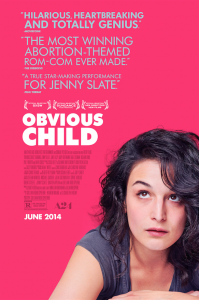By Rebecca Sirull, inside editor
When Gillian Robespierre, Anna Bean and Karen Maine first wrote the short film “Obvious Child” in 2009, they didn’t intend to break cinematic ground or start a revolution. They just had a story they wanted to tell and a funny way of telling it. Fast-forward five years to the release of the feature-length film and that story has the potential to change the way mainstream media approaches unplanned pregnancies and the women who deal with them.
“Obvious Child” centers around Donna, a 20-something comedian living in New York City, played by Jenny Slate. After getting dumped within the first 10 minutes of the film, Donna goes on to have a one-night stand, resulting in her pregnancy. Throughout the movie, Donna struggles to reconcile her emotions regarding this unexpected situation, her budding romance with the man who is responsible for it, and the minor issue of what she’s doing with her life.
The News sat down with Robespierre and Slate to discuss the making of the movie, the complexity of its characters and what they hope to accomplish through its creation.
Robespierre explained that the biggest moment for the script was when Slate came on board for the role of Donna. After scouring the New York comedy scene for the perfect fit, Robespierre finally stumbled on a free comedy show called “Big Terrific” in Brooklyn, featuring Slate and friend Gabe Liedman.
“We had an urge and a desire to tell a story that had a really funny, and actually funny, leading lady, who looked and sounded like us and not like the ones that have been churning out of the Hollywood system in romantic comedies,” Robespierre said.
Slate’s brand of blunt, honest and all-too-relatable humor proved to be exactly what Robespierre, Bean and Maine needed to bring their character to life. And for Slate, it was a chance to portray a character that was at once dynamic and recognizable.
“It was a story I hadn’t read before, in many different ways,” Slate said. “The comedy was new and fresh and belonged to a vernacular that I understand and that I feel like comes out of a more honest movement and trend in comedy, but that I haven’t seen in a scripted piece before. It was a chance for me to play someone who was equally funny as they were vulnerable.”
It’s clear why Slate was so eager to take on the role of Donna as she is one of the most fun and interesting characters to watch. Part of her appeal is the unabashed honesty with which she approaches each of her challenges. She tells the story that many women have experienced in a way that makes all women feel like they have experienced it too. Her emotions are tangible, understandable and above all realistic. She doesn’t dissolve into a puddle of tears when times are tough, but she’s not a stone wall either, and she’s certainly not immune to vulnerability. One of Robespierre’s main goals in making the character of Donna a stand-up comedian was to show this dichotomy in her personality.
“We used stand-up mostly as a way to have Donna go through her changes in a very public way and have this character be more comfortable onstage and more comfortable being very sort of, tell all-y onstage, but offstage she’s just not that person,” Robespierre said. “She’s very, not closed, because I don’t think Donna’s closed at all…but she’s not as empowered offstage.”
While not all of us are stand-up comedians, everyone can relate to feeling more confident when they are in their element. From this, Donna draws her strength and her ability to approach her situation in such a matter-of-fact way.
It’s this frank and guilt-free portrayal of abortion that garnered online attention when the short was first released and that provides hope for millions of women who want to see their lives depicted honestly in the media. Robespierre said that websites like Bust and Jezebel began posting her film and writing articles about it, and women responded with gratitude, noting how rarely films and TV show unashamedly discuss abortions.
Not only does the film give hope for the future of women in the media, but it’s also hilarious, heartwarming and surprisingly empowering. It encompasses the entire spectrum of emotion, showing that romantic comedies don’t just have to be the stereotypical chick flicks we’ve come to expect from Hollywood. In just two short hours it makes us both laugh uproariously and rethink the way the media has been telling us to think for years. Through Donna’s strength we gain our own and by drawing humor from life’s twists and turns we remember to do the same.
Photo courtesy A24films.com.









